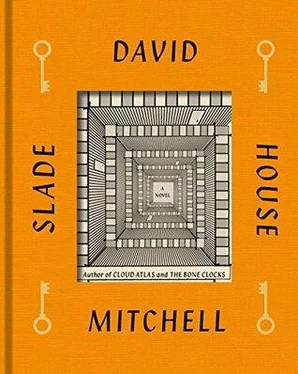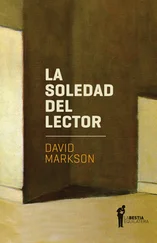David Mitchell - Slade House
Здесь есть возможность читать онлайн «David Mitchell - Slade House» весь текст электронной книги совершенно бесплатно (целиком полную версию без сокращений). В некоторых случаях можно слушать аудио, скачать через торрент в формате fb2 и присутствует краткое содержание. Год выпуска: 2015, Издательство: Random House, Жанр: Современная проза, на английском языке. Описание произведения, (предисловие) а так же отзывы посетителей доступны на портале библиотеки ЛибКат.
- Название:Slade House
- Автор:
- Издательство:Random House
- Жанр:
- Год:2015
- ISBN:нет данных
- Рейтинг книги:3 / 5. Голосов: 1
-
Избранное:Добавить в избранное
- Отзывы:
-
Ваша оценка:
- 60
- 1
- 2
- 3
- 4
- 5
Slade House: краткое содержание, описание и аннотация
Предлагаем к чтению аннотацию, описание, краткое содержание или предисловие (зависит от того, что написал сам автор книги «Slade House»). Если вы не нашли необходимую информацию о книге — напишите в комментариях, мы постараемся отыскать её.
) comes a taut, intricately woven, spine-chilling, reality-warping short novel. Set across five decades, beginning in 1979 and coming to its electrifying conclusion on October 31, 2015,
is the perfect book to curl up with on a dark and stormy night.
Slade House — читать онлайн бесплатно полную книгу (весь текст) целиком
Ниже представлен текст книги, разбитый по страницам. Система сохранения места последней прочитанной страницы, позволяет с удобством читать онлайн бесплатно книгу «Slade House», без необходимости каждый раз заново искать на чём Вы остановились. Поставьте закладку, и сможете в любой момент перейти на страницу, на которой закончили чтение.
Интервал:
Закладка:
My mind’s jolted and clattery: Chloe Chetywnd? Norah Grayer? Same woman? How? How? The paintings? Why? Why bring a CID officer up to bed? Why lure him up the stairs where he’ll see the paintings? Makes no sense. What I do know is that Slade House isn’t a police station, a prison or a psychiatric ward, and it looks very like we have a case of illegal imprisonment. Ordinarily — ha, “ordinarily”—I’d go, get back-up and warrants and come back, but in this mad bugger’s scenario, where I may— may —have just shagged a thirty-one-year-old killer-slash-abductress-slash-whatever-the-fuck-she-is, I’d rather get Rita Bishop out first and call in a Code Ten to Slade House after. If I’m wrong and Trevor Doolan de-bollocks me then so be it. “Mrs. Bishop: do you know where the key is?”
She’s still a softly sobbing mess on the floor.
I notice the sound of the shower’s stopped.
“Mrs. Bishop — help me help you— please. ”
The woman lifts her head and fires hate-rays at me: “As if you’ll just unlock this door after nine years. As if .”
For Chrissakes. “If I am who I say I am, you’ll be out of Slade House in two minutes and I swear on all that’s holy, Mrs. Bishop, I’ll have armed officers in here within thirty minutes and ‘the Monster’ in custody, and in the morning CID and Scotland Yard and Forensics on Nathan’s trail, so will you please just tell me where the key is? Right now I’m your only chance of seeing your son again.”
Something in my voice persuades Rita Bishop to give me a chance. She sits up. “The key’s on the hook. Right behind you. The Monster likes me to see it.”
I turn around: a long, thin, shiny key. I take it, and fumble, and drop it. It hits the floorboard with a pure note. I pick it up and see the steel square in the cage door and push the key into the keyhole. It’s well oiled and the door swings open and Rita Bishop staggers onto her feet and backs off and sways forwards and stares like she can’t believe it. “Come on, Mrs. Bishop,” I whisper, “out you come. We’re leaving.”
The prisoner takes uncertain steps to the cage door where she grips my hand, and steps out. “I, I …” Her breathing’s all raspy.
“Easy does it,” I tell her. “It’s okay. Do you know if … if ‘she,’ ‘they,’ if they’ve got weapons?”
She can’t answer. She’s gripping my dressing gown, quivering. “Promise me, promise me, I’m not dreaming you.”
“I promise. Let’s go.”
Her fingers dig into my wrist. “And you’re not dreaming me?”
I stay patient: if I’d been locked up for nine years, I’d be off my rocker too. “I guarantee it. Now let’s get out of here.”
She releases me. “Look at this, Detective.”
“Mrs. Bishop, we need to leave.”
Ignoring me, she holds up a lighter.
Her thumb flicks and a thin flame …
… grows longer, paler and still as a freeze-frame. It’s not a lighter any more, it’s a candle, on a chunky metal base with writing all over it, Arabic or Hebrew or Foreign. The cage has gone. All the furniture’s gone. Rita Bishop’s gone. The candle’s the only source of light. The shrunken attic’s black as inside a coffin deep inside a blocked-up cave. I’m kneeling, I’m paralyzed, and I don’t know what’s happening. I try to move but no joy. Not even a finger. Not even my tongue. My body’s the cage now, and I’m the one locked in. The only things working are my eyes and my brain. Work it out, then. Nerve gas? A stroke? I’ve been Mickey Finned? God only knows. Clues, then, Detective? There’re three faces in the dark. Straight ahead, across the candle, there’s me in a dead man’s dressing gown. A mirror, obviously. On my left there’s Chloe, in a hooded padded robe thing. On my right there’s … a male Chloe. Chloe’s twin, I’m guessing — this blond guy, dressed in a robe thing like Chloe’s, handsome in a sort of gay model Hitler Youth way. Neither of them is moving. A few inches from the candle-flame there’s a brownish moth, just frozen in the air, frozen in time. I’m not dreaming. That’s about all I’m sure of. So is this the story of how Detective Gordon Edmonds lost his mind?
After some time’s passed, I don’t know how much, the candle hisses and its white flame sways this way and that. The moth flaps around, in and out of the dark; now I see it, now I don’t. “You’re smirking, Brother,” says Chloe, if that’s her real name. This woman has the same face as the one who served me tiramisu but her voice before was woolen, now it’s a rusty jackknife.
“I am not smirking,” objects the man, moving his legs like they’ve got pins and needles.
I try to move too. I still can’t. I try to speak. I can’t.
“You’re a damned liar, Jonah,” says Chloe. She holds up her hands like they’re a pair of gloves she can’t make up her mind about. “ I didn’t smirk when you serviced that hairdresser two cycles ago. And you really did exchange fluids; I only threw this dog-on-heat”—she gives me a disgusted, sideways look—“an imaginary bone.”
“ If I smiled,” says the man, “it was a smile of pride at your performance in my sub-orison. You played the neurotic widow to perfection. The attic cage was one of my finest mises en scène, I think we’ll agree, but Meryl Streep herself could not have played poor Mrs. Bishop with finer aplomb. Why, I scarcely noticed the prickly creature, all those years ago. Her voice hurt my ears. Why the long face, Sister? Yet another Open Day has gone swimmingly, our Operandi has proven itself robust, our pheasant is plucked and basted, yet you’re looking all … vinegary.”
“The Operandi is an improvised hotch-potch, too reliant—”
“Norah, I beg you, we’re about to dine; can’t we just—”
“— too reliant upon luck, Jonah. Upon nothing going wrong.”
The man — Jonah — looks at his sister — Norah — with fond smugness. “For fifty-two years, our souls have wandered that big wide world out there, possessing whatever bodies we want, living whatever lives we wish, while our fellow birth-Victorians are all dead or dying out. We live on. The Operandi works .”
“The Operandi works pro vi ded our birth-bodies remain here in the Lacuna, freeze-dried against world-time, anchoring our souls in life. The Operandi works pro vi ded we recharge the Lacuna every nine years by luring a gullible Engifted into a suitable orison. The Operandi works pro vi ded our guests can be duped, Banjaxed and drawn into the Lacuna. Too many ‘provided’s, Jonah. Yes, our luck’s held so far. It won’t hold forever.”
I’ve got no idea what they’re on about, but Jonah looks properly pissed off. “Why this illuminating lecture now, Sister?”
“We need to make the Operandi proof against mischance and enemies.”
“What enemies, Sister? Thanks to my insistence on isolation, not even the Shaded Way know about us. Our life-support system works: to tamper with it would be the danger. Now, supper is served.” Jonah looks my way. “That would be you. Are you ready to die?”
I try but I can’t move, or fight, or beg. I can’t even shit myself.
“You’ve stopped breathing,” Jonah tells me, matter-of-factly.
No no no, I must be breathing, I think. I’m still conscious.
“Not for much longer,” says Jonah. “After four minutes without oxygen, the brain damage becomes irreversible, and although I don’t have my watch on me, I’d say you’ve had two. You’d die after six minutes, but we intervene prior to the final agony. We’re not monsters.”
Читать дальшеИнтервал:
Закладка:
Похожие книги на «Slade House»
Представляем Вашему вниманию похожие книги на «Slade House» списком для выбора. Мы отобрали схожую по названию и смыслу литературу в надежде предоставить читателям больше вариантов отыскать новые, интересные, ещё непрочитанные произведения.
Обсуждение, отзывы о книге «Slade House» и просто собственные мнения читателей. Оставьте ваши комментарии, напишите, что Вы думаете о произведении, его смысле или главных героях. Укажите что конкретно понравилось, а что нет, и почему Вы так считаете.












